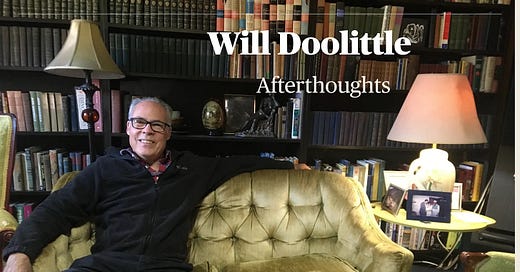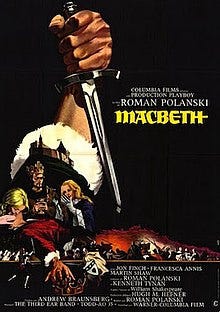'Macbeth' and other stories are suitable for teens
Lake George candidate converted to the forces of censorship
Back in the spring of 2004, Linda Clark was suspended for a month and a half from her job as a 10th grade English teacher in Schuylerville for showing her class an R-rated version of the Shakespeare play, “Macbeth.”
A story in the Post-Star a few months later said the movie was the 1971 version, directed by Roman Polanski. The film was criticized for its violence and nudity, but the play itself is one bloody scene after another, until Macduff kills Macbeth and walks on stage with his head, so the violence, at least, seems unavoidable.
And nakedness is a valid choice (here and there — it’s not as if the whole movie is filmed in the buff) in a play brimming with naked ambition and naked cruelty.
“… Come you spirits/That tend on mortal thoughts, unsex me here;/And fill me from the crown to the toe top-full/Of direst cruelty!” says Lady Macbeth in an Act I soliloquy.
“…Come to my woman’s breasts,
And take my milk for gall, you murdering ministers.
Wherever in your sightless substances
You wait on nature’s mischief! Come, thick night,
And pall thee in the dunnest smoke of hell,
That my keen knife see not the wound it makes,
Nor heaven peep through the blanket of the dark,
To cry, ‘Hold, hold!’”
I like Roger Ebert’s review of the movie, which he describes as brutal and chaotic and lacking the reverence with which modern directors usually treat Shakespeare.
“Polanski has imposed this vision on the film so effectively that even the banquet looks like a gang of highwaymen ready to wolf down stolen sheep,” he writes. “It's as if the play has been inhabited by Hell's Angels who are quick studies.”
All this is to say the movie, which was part of the school’s collection for classroom use, was a great choice for teenagers.
Young people like works that terrify them, whether it’s a novel by Dean Koontz or a video game like “The Last of Us,” and showing teens that Shakespeare can be as wild and scary as zombies is time well spent.
So, back to Linda Clark, who recently ran for a spot on the Lake George school board and lost to two incumbents.
Clark hung up on me when I asked her about the “Macbeth” episode, so I didn’t get to tell her she was in the right. Polanski’s bloody, brilliant “Macbeth” should be at the top of the viewing list for high school English classes.
The notion that teenagers must be protected from the challenges and complexities of adult life — that issues such as sexuality and gender identity, for example, are too mature for them to read about or talk about (or think about) — contributes to the infantilization of people in their 20s, who should be ready to join the society of grownups.
We want our children to develop into well-informed, well-balanced adults, which means allowing them to figure out who they are by exploring for themselves.
Candidate Clark, however, condemned in a League of Women Voters debate what she called the “social agenda stuff” in the Lake George school district, blasting a policy that gives school staff leeway in notifying parents of students’ gender-nonconforming behavior and saying some books in the school library that address issues of sexuality and gender are “disgusting.”
When I called her, Clark said I was too late. The election was over.
But the fight over the rights of public school students is just beginning. In many states, a policy as enlightened as Lake George’s, which allows students to assert their own gender identity through their appearance and behavior, would be illegal.
In Florida, the state is investigating a teacher for showing her fifth-grade class the Disney animated film, “Strange World,” because it includes a young male character who has a crush on another male character. In Florida, state law forbids addressing sexual orientation or gender identity in public school classrooms in any grade.
That means “Macbeth” is out.
Banquo says, when the three witches confront him and Macbeth on the heath, “You seem to understand me,/By each at once her choppy finger laying/Upon her skinny lips: you should be women,/And yet your beards forbid me to interpret/That you are so.”
Shakespeare in general, with his playful use of cross-dressing, frequent talk of love between men, bold and unblushing descriptions of sex and gory scenes of torture and murder must be anathema to the modern-day Puritans trying to take control of the public school system.
It is ironic that Clark, previously attacked and punished by the forces of censorship, chose to run on a censorious platform. But perhaps she is changing her approach.
“I’m moving on in a different direction to accomplish my goals,” she told me before she cut our connection.
I don’t know what she meant, but I hope she intends to return to the days when she embraced Polanski’s “Macbeth.”






I guess Laurence Fishburne's "Othello" movie would be on the banned list, too, with Kenneth Branagh's gay Iago. Or Pasolini's adaptation of Euripede's Medea, characterized by one film critic as a "Marxist allegory". (I'm sure the censors would be fine with Medea as a raging madwoman a la Fatal Attraction because, you know, misogyny is always cool, but that communist stuff... can't have that)
We should put together a whole list of movies we think censors would like to ban and then have a film festival. Maybe we can get a drag queen to host it. :-)
Infantilization of our teens. Spot on. Stems from immature parents, methinks. Out, out damn spot!